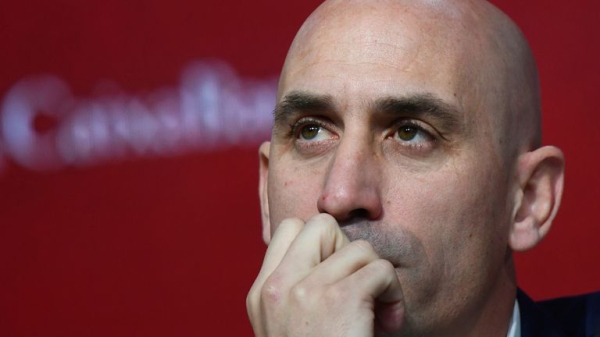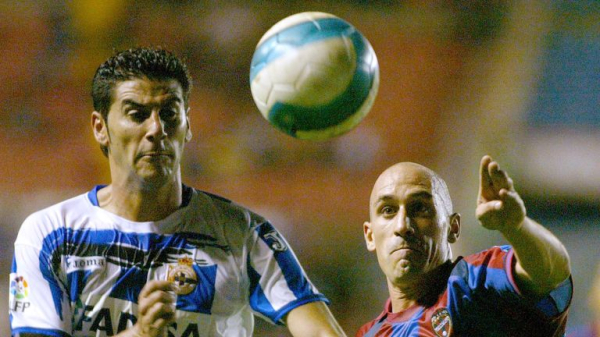Who is Luis Rubiales – the Spanish FA boss at the centre of the World Cup kissing row?

Instead of celebrating its women’s World Cup triumph, Spanish football has been overshadowed by the actions of one of its most powerful men.
Luis Rubiales, the president of the Royal Spanish Football Federation (RFEF), has been suspended by FIFA for 90 days after grabbing and kissing player Jenni Hermoso after the final in Sydney on 20 August.
She says that in “no moment” did she consent to the kiss.
He has remained defiant in the face of mounting criticism, saying he’s the subject of a “witch hunt” by “false feminists”.
In an extraordinary speech last week, the 46-year-old said: “Do you really think I deserve this hunt? People demanding my resignation? Is this so serious for me to resign, having done the best management of Spanish football?
“Do you think I need to resign?” – before going on to say for five times that he would not.
As his fate hangs in the balance ahead of an “extraordinary and urgent” meeting of the football federation later today, Sky News looks at his rise to the top of Spanish football – and the controversies along the way.

Late start to footballing career
Luis Rubiales was born on the Spanish Canary Islands in 1977 and grew up in the southern province of Granada.
It wasn’t until the early 2000s and his late 20s that his football career took off.
As a defender, he played mainly in Spain’s second division league for clubs such as Mallorca B, Lleida, Xerez and Levante.

During his time at Levante, they were promoted to La Liga, with Mr Rubiales making 53 appearances for them between 2004 and 2008.
The first minor controversy of his career also came while he was there, leading his fellow players out on strike over unpaid wages.
At the age of 32, in 2009, he signed a one-year deal to move to Scotland and play for the Hamilton Accies – but left after just two weeks and retired back to Spain.
Union chief
The following year he became the president of the Association of Spanish Footballers (AFE) union.
While his time there was free of scandal, since the World Cup kissing row emerged, the union’s then-marketing and commercial director, Tamara Ramos, has claimed she quit the AFE having been publicly humiliated by Rubiales on several occasions.
The Spanish federation has accused Ms Ramos of “taking advantage of the current media climate”.
Last year Mr Rubiales insisted there is a “campaign to discredit him”.
He claimed that he “cannot guarantee one day they will put a bag of cocaine in the boot of my car” – without making clear who he was referring to.
Spanish FA boss
Mr Rubiales remained president of the union until November 2017 when he took his current job as head of the football federation. He had already been on the board of directors there for six years.
The federation runs Spain’s men’s and women’s national football teams and its semi-professional and amateur leagues. It also organises the referees for La Liga.
A few weeks into the job, he made a big decision: firing Julen Lopetegui, the coach of the men’s team, just two days before their first match at the 2018 World Cup in Russia.

Mr Lopetegui had signed to join Real Madrid after the tournament, and Mr Rubiales accused him of being disloyal to his national team.
With a hastily appointed replacement, Spain failed to get beyond the final 16.
The following year, Mr Rubiales became vice president of UEFA.

That same year he was back in the headlines for expanding the Spanish Super Cup from two teams – the winners of La Liga and Copa del Rey – to four – including the runners up as well.
He also moved the competition to Saudi Arabia for $40m (£32m) a year. While the move was lucrative, it drew widespread criticism because of the country’s poor record on human and women’s rights.
A Spanish judge is still examining the contracts awarded for the cup, with accusations of a conflict of interest with former Barcelona star Gerard Pique’s company. Mr Rubiales strongly denies all the allegations.
In 2021 an architect tasked with renovating his Valencia home accused him of non-payment and assault.
Mr Rubiales was found not guilty of both charges against Yasmina Eid-Macchet.

World Cup scandal could have cost him key ally
The current controversy over the World Cup kiss isn’t his first involvement with the Spanish women’s side.
When 15 players went on strike, citing their coach Jorge Vilda’s attitude to their “emotional and physical wellbeing”, Mr Rubiales was quick to back him.

Mr Vilda has stayed loyal to him until now, being quoted after Spain’s semi-final victory over Sweden as saying his support “means so much and will always stay with me”.
Mr Rubiales said in return on Friday: “Jorge Vilda, they wanted to do to you the same thing that they are doing to me now. We’ve been through a lot, but we’ve been together.”


When Mr Rubiales delivered his fiery speech to the RFEF’s general assembly last week in which he repeatedly said he would not resign, Mr Vilda applauded him.
Mr Vilda said at the weekend that the controversy was “real nonsense” that had “tarnished a well-deserved victory” – but also criticised Mr Rubiales’ “inappropriate behaviour”.
He did not resign, even as 11 members of Spain’s staff did.
Meanwhile players, fans and women across Spain and beyond have made which one they are on abundantly clear.
